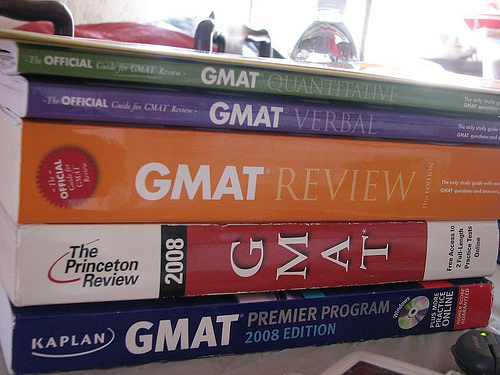10 Steps to “Hacking” The Admissions Process At Elite Business Schools

Woody Allen famously said that “half of life is just showing up.” Yet, paradoxically, most aspiring business students take themselves out of the running for elite MBA programs before anyone else does. Standing in awe of the exclusive reputations schools like Harvard and Wharton possess, they simply assume they would never get accepted, rather than studying the system and putting their best foot forward. It may come as a surprise, however, that getting into a top MBA program is not impossible. Though certainly not “easy”, the admissions process is quite straightforward and can be “hacked” by students who understand how it really works.
Understand what the school is looking for

Have you ever asked yourself what makes elite business schools so famous? Is it the buildings? The faculty? The course formats? The location? Actually, it’s none of these things. What truly separates top-tier business schools from their less-celebrated counterparts is their alumni. Would Harvard be Harvard without Meg Whitman? Would Wharton be Wharton without Warren Buffet? Would Stanford be Stanford without Steve Ballmer? Of course not!
Taking this into account, you should now see what institutions like these are looking for. They want students with the potential to become famous – and, by extension, keep the school famous.
Think like a marketer, not a student

This realization should trigger a paradigm shift in how you approach the admissions process. Instead of thinking like a student (“is my GPA high enough?”) you need to think like a marketer. What does that mean specifically?
It means that you are the product and the schools are your customers. It means that your application is a sales pitch on why the admissions department should pick you over everyone else. It means that rather than just listing your achievements and expecting them to speak for themselves, you need to aggressively differentiate yourself as the best candidate.
Abandon “all-or-none” thinking

It’s tempting to assume that iconic business schools only accept “academic superstars” with flawless applications. And while Ivy League quarterbacks and straight A students DO have a leg up in the admissions process, they are hardly the only ones who get in. In fact, there is no one-size-fits-all profile for what types of students delight the admissions teams.
You stand a reasonable chance of acceptance if you fit into EITHER of the following two profiles:
Profile 1:
– You either graduated from a top undergrad school or have worked somewhere prestigious
– Your GPA and GMAT scores are not disastrously low (for example, a 2.5 GPA and 550 GMAT)
Profile 2:
– You didn’t graduate from an amazing school or work for an amazing company
– Your GPA and GMAT scores are strong (for example, a 3.5 GPA and 730 GMAT)
As you can see, there are considerable opportunities for less-than-stellar students to get accepted.
Do your competitive research

One of the other ways students declare themselves unworthy of top MBA programs (besides all-or-none thinking) is believing the admissions criteria is a mystery. Yet nothing could be further from the truth. Most business schools freely publish in-depth summaries of their student body. Check out the MBA Class Profile” published by Harvard Business School.
In one tidy page, you can see the GMAT score range of 2013’s students, median GMAT, average age, undergraduate majors, and other key data points. Many students will be surprised to learn that they fit somewhere within these numbers and are therefore NOT automatically guaranteed to be rejected. Even if not, these numbers offer clear guidance in what to work on before applying.
Craft a compelling career vision

Think back to the beginning of this article when we clarified what top business schools are looking for. They want future captains of industry, students with a realistic chance of going on to make the school even more famous than they already are. At this point, you might begin to feel uneasy. What if you don’t have any lofty dreams for your post-MBA life? What if all you really want to do is spend 15-20 years as a management consultant and retire early to Hawaii?
That’s fine – but you can’t say it. These schools only accept a few hundred students per year. If their number one goal is producing the next Jack Welch, why would they waste even a single spot on someone with such modest ambitions? They wouldn’t – which is why, in the essay section of your application, it’s critical to express an exciting career vision worthy of a top-shelf MBA program.
Ensure that your career vision is believable

Now, having said that, it’s important that your career vision is not just exciting, but believable. The admissions officers at Harvard or Stanford aren’t stupid. If your stated career goal is transforming higher education in Africa (but you’ve never gone to Africa or shown the slightest interest in it before now) you cannot expect them to believe you.
Rather, your career vision needs to be connected to your past in a tangible, credible way. For inspiration, look to your academic and professional history: internships you’ve completed, special projects you’ve worked on, papers you’ve written, jobs you’ve held. It is from these activities that your career vision should emerge, not an aimless desire to impress the admissions board.
Convey a strong intellect and academic background

Contrary to popular assumptions, your career vision is much more likely to get you into a top business school than anything else. Admissions officers see high GPAs and GMAT scores every day of their working lives. Even if you have a 4.0 GPA, it isn’t the first they’ve seen and it surely will not be the last.
On the other hand, elite schools don’t accept every applicant with a convincing essay either. Your career vision will be much more believable and compelling if supported with a strong intellect and academic background. Primarily, this comes down to your undergraduate GPA and GMAT scores. Refer back to your competitive research to determine how high each should be. Generally, of course, higher is better.
Use extracurricular activities to demonstrate leadership traits

Business schools (especially the best ones) are big on extracurricular activities and volunteer work. Why is that? Are they just throwing yet another onerous “box” to check on top of you needing to also have stellar grades and an exciting career vision? Do they just want to see you struggle? Actually, that’s not why.
Remember that business schools are trying to produce the next generation of leaders: Fortune 500 CEOs, change agents, and innovators. These people tend to have certain traits – empathy, motivation, self-confidence, social skills – that non-leaders lack. By preferring students with track records of public service, these schools help filter out applicants who are unlikely to be amazing leaders. Keeping this in mind, you should seek to portray your extracurricular experience in ways that advertise these key leadership characteristics.
Be strategic about your letters of recommendation

You generally only get one or two essays to express yourself within business school applications. This makes your letters of recommendation especially critical. Do not (as so many students do) “mail it in” by using random person willing to say nice things about you. Having crafted a unique career vision, your letters of recommendation need to reinforce that vision with specific statements of tangible, appealing value from people who know you.
In other words: don’t just pick any old college professor from your past. Pick the BEST one. If your career vision involves technology, use your programming instructor. If it involves social change, ask the director of your honor society or volunteer groups. Make sure the people recommending you are the ones truly qualified to back up the promises made in your essay.
Be yourself during the interview

If you’ve gotten this far, congratulations! Being invited to an interview is a strong signal that the admissions team is intrigued by your application. However, if you aren’t careful, your interview could sabotage all the hard work you’ve put in so far. PoetsAndQuants.com sums it up nicely in a post about how now to blow a business school interview:
“Some think this is like an audition for a symphony orchestra where the conductor is choosing one violinist out of ten and you have to be .001 better than nine other people. It’s not that. It’s more like an audition for a marching band. You just have to be able to bang a drum in terms of talent and not appear to be arrogant, inward, unsure of yourself, or confused.”
Essentially, this means that you should not show up with a rehearsed speech or tired cliches you think the interviewer wants to hear. Much like your career vision essays, this is a chance to let “the real you” shine through. Speak naturally, don’t take yourself too seriously, and simply be yourself. After all: if you were invited to interview, that is likely what got you there in the first place.



